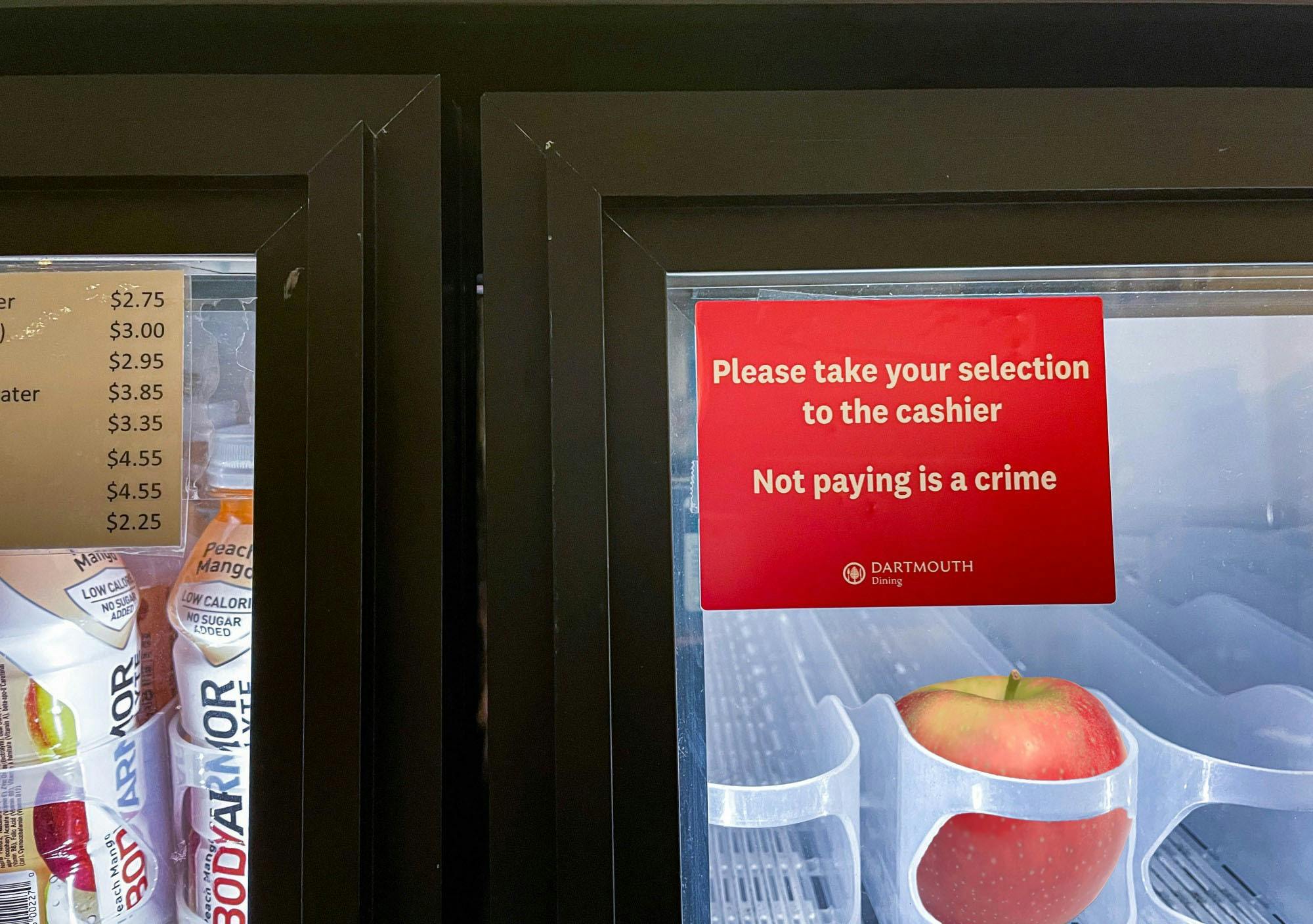Dartmouth is a funny place. We can leave our laptops unattended for hours in the library, with confidence that it will remain untouched. Yet, once we walk down the stairs to Novack Cafe, granola bars, sushi and drinks are all fair game to be taken. Even when it comes to stealing, Dartmouth still prides itself on community.
Stealing is extremely common and normalized at Novack. Daniel Lampert ’25, who frequents Novack multiple times a week, said he estimates that hundreds of people steal from Novack daily. Jordan Paff ’23 said she witnesses stealing every time she comes down the steps to the Cafe. Even a current Novack employee, who requested anonymity in order to speak candidly, sees people stealing “all the time.”
However, this stealing epidemic may be over. Beginning early last week, Dartmouth Dining Services began an anti-theft initiative at Novack. Equipped with plastic sheets over the snack stands, stanchions that divide the line and signs that remind students that “not paying is a crime,” Novack now resembles an airport terminal more than a college cafe.
Dartmouth Dining Services director Jon Plodzik explained how, with the old set up, it was very confusing for staff to see who had paid. The reconfiguration attempts “to create more of a ‘one way’ [traffic] through the area.”
In addition to physical changes to Novack, employees have been instructed to confront people attempting to steal from the cafe, according to the anonymous employee.
“If they don’t respond to it and we care, we are prompted to call [Safety and Security],” they said.
The decision to crack down on stealing was allegedly due to gaps in inventory and student employee concern.
“Some of the student employees have been reaching out to the managers who are operating [Novack] with concerns,” Plodzik explained, “We know how much sushi, for example, we bring in and we know how much we sell, and when there is a gap beyond what would be a reasonable gap, there is concern.”
The Novack student employee said that they are annoyed about the initiative because it puts them in the awkward position of stopping students from stealing something as small as a bag of chips, and also because it distracts them from all of the duties of being a Novack employee, including “stocking, making drinks, putting stuff in the bakery, cleaning” and more.
“This stealing initiative just takes so much more time for no reason,” they said.
Just as the anti-theft initiative may pose an inconvenience for workers, theft itself may be borne out of inconvenience for students.
“Part of the reason [people steal] is that the Novack line is so long and things are ridiculously expensive sometimes,” said Lauren Kayari ’25.
Lampert speculates that people steal more out of convenience than necessity when — in a majority of the situations — people could “totally” be paying for the food
Many students justify stealing not only due to convenience, but also due to the common lore that DDS tacks on $100 to the meal plan to account for stealing. Kayari noted that while she does not steal, she has heard of, and believes, that the stealing cushion exists.
However, according to Plodzik, this is just a myth.
“There is absolutely no truth to that at all,” he said. “The meal plan is truly based on covering our expenses in the food that is associated with providing the [dining] service.”
Further, some students believe Dartmouth to be a wealthy institution that can afford petty student theft.
“All of us pay a lot to be here, and there’s not an incredibly taxing conflict or problem in the finances of Dartmouth to the point where they can’t have people stealing … They’re not crying over chips and a bar,” the employee said.
Kayari also notes that DBA does not feel like real money, which makes people feel less bad about stealing. Moreover, as more students see their classmates steal and get away with it, students largely do not feel remorse in taking from the College — and even endorse this behavior.
Thus, stealing from Novack is embedded in Dartmouth’s culture. Personally, within my first week on campus, upperclassmen not only told me about flair and the Dartmouth Seven, but also the proper way to steal from Novack. Nonetheless, Paff has noticed that people have been stealing more than ever before as of late. She chalks it up to resentment toward the College students may feel due to COVID-19 policies.
Despite this, the anti-stealing initiative has definitely grabbed students’ attention and may change their future behavior.
“People are definitely talking about the crackdown [and] warning people to not steal from Novack,” Lampert noted, “The culture is that people still want to steal — just now, they can’t.”
In a final plea, Plodzik directed a message to the student body.
“If people feel like they need to take something because they don’t have the means to pay for it, they should talk to me,” he said. “... Taking food off the shelves and not paying for them is not the answer; it’s not the right method to go about life.”




